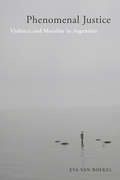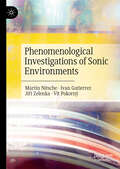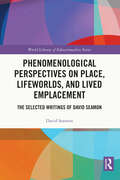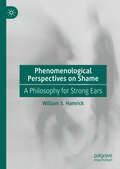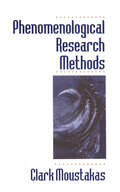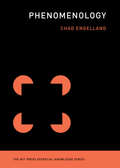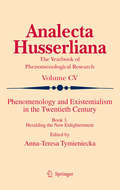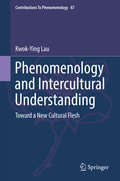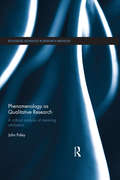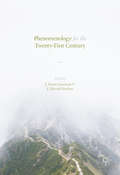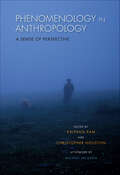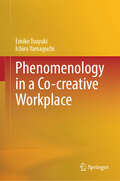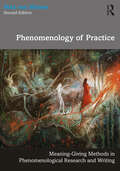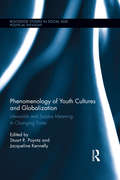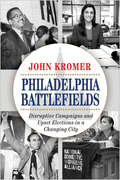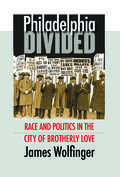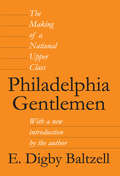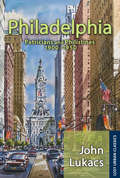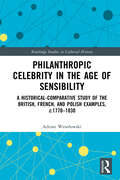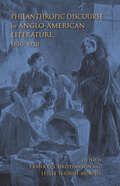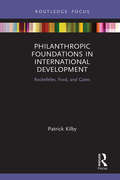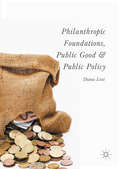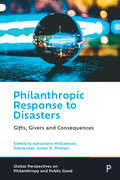- Table View
- List View
Phenomenal Justice: Violence and Morality in Argentina (Genocide, Political Violence, Human Righ)
by Eva van RoekelHow do victims and perpetrators of political violence caught up in a complicated legal battle experience justice on their own terms? Phenomenal Justice is a compelling ethnography about the reopened trials for crimes against humanity committed during the brutal military dictatorship that ruled Argentina between 1976 and 1983. Grounded in phenomenological anthropology and the anthropology of emotion, this book establishes a new theoretical basis that is faithful to the uncertainties of justice and truth in the aftermath of human rights violations. The ethnographic observations and the first-person stories about torture, survival, disappearance, and death reveal the enduring trauma, heartfelt guilt, happiness, battered pride, and scratchy shame that demonstrate the unreserved complexities of truth and justice in post-conflict societies. Phenomenal Justice will be an indispensable contribution to a better understanding of the military dictatorship in Argentina and its aftermath.
Phenomenological Investigations of Sonic Environments
by Martin Nitsche Ivan Gutierrez Jiří Zelenka Vít PokornýPhenomenological approaches to sounds, noises, voices, and music traditionally privilege methods that center visual perception. This book aims not only to phenomenologically describe sonic environments, but also to develop an audition-centered phenomenological methodology to enable this task. "Sonic environment" is this book's term for the acoustic shape of human life-environment, which is multisensory and does not exclude visual, tactile, olfactory, and gustatory sensations connected with sounds or their sources. Sonic environments (in so far as they are lived) are not composed of separate sounds, but created by “sonic phenomena” – i.e., lived (real or imagined) experiences with sounds, noises, voices, and music. Just as phenomenology traditionally privileges the visual over the audio, phenomenology thematically prefers listening to a voice or a music over less articulated sonic experiences (i.e., sounds without an obvious meaning, melody, or rhythm).In this respect, the book not only provides missing phenomenological descriptions of sonic environments, but also redefines phenomenological methodology with respect to acoustic perception.
Phenomenological Perspectives on Place, Lifeworlds and Lived Emplacement: The Selected Writings of David Seamon
by David SeamonPhenomenological Perspectives on Place, Lifeworlds and Lived Emplacement is a compilation of seventeen previously published articles and chapters by David Seamon, one of the foremost researchers in environmental, architectural, and place phenomenology. These entries discuss such topics as body-subject, the lived body, place ballets, environmental serendipity, homeworlds, and the pedagogy of place and placemaking. The volume's chapters are broken into three parts. Part I includes four entries that consider what phenomenology offers studies of place and placemaking. These chapters illustrate the theoretical and practical value of phenomenological concepts like lifeworld, natural attitude, and bodily actions in place. Part II incorporates five chapters that aim to understand place and lived emplacement phenomenologically. Topics covered include environmental situatedness, architectural phenomenology, environmental serendipity, and the value of phenomenology for a pedagogy of place and placemaking. Part III presents a number of explications of real-world places and place experience, drawing on examples from photography (André Kertész’s Meudon), television (Alan Ball’s Six Feet Under), film (John Sayles’ Limbo and Sunshine State), and imaginative literature (Doris Lessing’s The Four-Gated City and Louis Bromfield’s The World We Live in). Seamon is a major figure in environment-behavior research, particularly as that work has applied value for design professionals. This volume will be of interest to geographers, environmental psychologists, architects, planners, policymakers, and other researchers and practitioners concerned with place, place experience, place meaning, and place making.
Phenomenological Perspectives on Shame: A Philosophy for Strong Ears
by William S. HamrickThis book utilizes Maurice Merleau-Ponty’s fascinating philosophy of embodiment to cast further light on the incredibly rich and complex phenomenon of shame. The philosopher himself made only scattered references to shame, but both his early phenomenology and his later phenomenological ontology do provide unique illumination of the phenomenon. The book demonstrates how Merleau-Ponty’s work is relevant to those of certain other thinkers in the analytic tradition.
Phenomenological Research Methods
by Clark MoustakasIn this volume, Clark Moustakas clearly discusses the theoretical underpinnings of phenomenology, based on the work of Husserl and others, and takes the reader step-by-step through the process of conducting a phenomenological study. His concise guide provides numerous examples of successful phenomenological studies from a variety of fields including therapy, health care, victimology, psychology and gender studies. The book also includes form letters and other research tools to use in designing and conducting a study.
Phenomenology (The MIT Press Essential Knowledge Series)
by Chad EngellandA concise and accessible introduction to one of the major recent philosophical movements--which investigates the experience of experience. This volume in the MIT Press Essential Knowledge series offers a concise and accessible introduction to phenomenology, a philosophical movement that investigates the experience of experience. Founded by Edmund Husserl (1859-1938) and expounded by Max Scheler, Martin Heidegger, Maurice Merleau-Ponty, and others, phenomenology ventures forth into the field of experience so that truth might be met in the flesh. It investigates everything as experienced. It does not study mere appearance but the true appearances of things, holding that the unfolding of experience allows us to sort true appearances from mere appearance.
Phenomenology and Existentialism in the Twenthieth Century
by Anna-Teresa TymienieckaThe great flourishing in the Twentieth Century of the amalgamated movement of Phenomenology and Existentialism, having reached its unfolding and reverberation - as we have shown in our two preceding books and continue in this one - seems to have spanned the entire gamut of their marvels. Although the philosophical field is being still corroborated by phenomenologico-existential insights, phenomenology remains itself enigmatic. The question of its foundations, as the source of sense remaining unsolved by Husserl (herein Verducci's study of Husserl and Fink, infra-page). And yet, the deepest phenomenologico-existential inspiration undertakes a new critique of reason (Verducci), the pivotal role of Imaginatio Creatrix (Egbe), Jean Wahl's quest after ultimate meaning (Kremer-Marietti) and the Logos of the "Moral Sense" (Cozma and Szmyd). Phenomenology is then reborn in the ontopoiesis of life (Tymieniecka) as "first philosophy" (Haney). We have here a powerful ferment we may call the New Enlightenment.
Phenomenology and Intercultural Understanding
by Kwok-Ying LauThis book approaches the topic of intercultural understanding in philosophy from a phenomenological perspective. It provides a bridge between Western and Eastern philosophy through in-depth discussion of concepts and doctrines of phenomenology and ancient and contemporary Chinese philosophy. Phenomenological readings of Daoist and Buddhist philosophies are provided: the reader will find a study of theoretical and methodological issues and innovative readings of traditional Chinese and Indian philosophies from the phenomenological perspective. The author uses a descriptive rigor to avoid cultural prejudices and provides a non-Eurocentric conception and practice of philosophy. Through this East-West comparative study, a compelling criticism of a Eurocentric conception of philosophy emerges. New concepts and methods in intercultural philosophy are proposed through these chapters. Researchers, teachers, post-graduates and students of philosophy will all find this work intriguing, and those with an interest in non-Western philosophy or phenomenology will find it particularly engaging.
Phenomenology as Qualitative Research: A Critical Analysis of Meaning Attribution (Routledge Advances in Research Methods)
by John PaleyPhenomenology originated as a novel way of doing philosophy early in the twentieth century. In the writings of Husserl and Heidegger, regarded as its founders, it was a non-empirical kind of philosophical enquiry. Although this tradition has continued in a variety of forms, ‘phenomenology’ is now also used to denote an empirical form of qualitative research (PQR), especially in health, psychology and education. However, the methods adopted by researchers in these disciplines have never been subject to detailed critical analysis; nor have the methods advocated by methodological writers who are regularly cited in the research literature. This book examines these methods closely, offering a detailed analysis of worked-through examples in three influential textbooks by Giorgi, van Manen, and Smith, Flowers and Larkin. Paley argues that the methods described in these texts are radically under-specified, and suggests alternatives to PQR as an approach to qualitative research, particularly the use of interview data in the construction of models designed to explain phenomena rather than merely describe or interpret them. This book also analyses, and aims to develop, the implicit theory of ‘meaning’ found in PQR writings. The author establishes an account of ‘meaning’ as an inference marker, and explores the methodological implications of this view. This book evaluates the methods used in phenomenology-as-qualitative-research, and formulates a more fully theorised alternative. It will appeal to researchers and students in the areas of health, nursing, psychology, education, public health, sociology, anthropology, political science, philosophy and logic.
Phenomenology for the Twenty-First Century
by J. Aaron Simmons and J. Edward HackettThis volume illustrates the relevance of phenomenology to a range of contemporary concerns. Displaying both the epistemological rigor of classical phenomenology and the empirical analysis of more recent versions, its chapters discuss a wide range of issues from justice and value to embodiment and affectivity. The authors draw on analytic, continental, and pragmatic resources to demonstrate how phenomenology is an important resource for questions of personal existence and social life. The book concludes by considering how the future of phenomenology relates to contemporary philosophy and related academic fields.
Phenomenology in Anthropology: A Sense of Perspective
by Michael JacksonThis volume explores what phenomenology adds to the enterprise of anthropology, drawing on and contributing to a burgeoning field of social science research inspired by the phenomenological tradition in philosophy. Essays by leading scholars ground their discussions of theory and method in richly detailed ethnographic case studies. The contributors broaden the application of phenomenology in anthropology beyond the areas in which it has been most influential—studies of sensory perception, emotion, bodiliness, and intersubjectivity—into new areas of inquiry such as martial arts, sports, dance, music, and political discourse.
Phenomenology in a Co-creative Workplace
by Ichiro Yamaguchi Emiko TsuyukiThis book introduces phenomenology to reveal how the atmosphere and relationships in the workplace are generated and how this affects creativity. In their daily work, people sometimes feel that "today's meeting was more exciting than expected" or that "everyone's motivation is down”. This unspoken workplace atmosphere has a significant impact on their work. But has enough thought been given to how this workplace atmosphere is created? Phenomenology reveals the basic structure of human relationships in the workplace. Are there any general rules that govern human interaction and the nature of relationships in that workplace? If these unspoken rules can be made explicit – clearly felt and spoken — people can work together to bring about a creative workplace in which individuals can maximize their abilities. The main point of the book is that human relationships are based on a two-layered structure: "emotional communication", which is rooted in human sensitivity and centers on sensation and emotion; and "verbal communication", which is based on shared intelligence and relies upon language and thought. The invisible layer of emotional communication is always at work as the foundation of verbal communication, creating what can be described as the "workplace atmosphere”. This book offers a new perspective on promoting creativity in the workplace by unraveling the principles behind the structure of workplace atmospheres.
Phenomenology of Practice: Meaning-Giving Methods in Phenomenological Research and Writing (Phenomenology of Practice)
by Max van ManenMax van Manen offers an extensively updated edition of Phenomenology of Practice: Meaning-Giving Methods in Phenomenological Research and Writing to provide an eloquent, accessible, and detailed approach to practicing phenomenology. Phenomenology of practice refers to the meaning of doing phenomenology on experiences that are of significance to those in professional practice such as psychology, health care, education, and in contexts of ordinary living. A special feature of this update is the role of examples, anecdotes, stories, and vignettes, and the singularity of fictionalized empirical fragments in making the unknowable knowable. Accordingly, the various chapters are enriched with many intelligible examples of phenomenological essays and excursions on ordinary and extraordinary topics. These examples show that a phenomenological method can be engaged to explore virtually any lived experience or event. Max van Manen provides penetrating portrayals of depthful insights by brilliant phenomenologists. He identifies and distinguishes a variety of phenomenological orientations that are alive and current today. This book is relevant to scholars, students, and motivated readers interested in the originary meanings and methods of phenomenological human science enquiry. Max van Manen’s comprehensive work is of significance to all concerned with the interrelation between being and acting, thoughtfulness and tact, in human sciences research and the phenomenology of everyday life.
Phenomenology of Youth Cultures and Globalization: Lifeworlds and Surplus Meaning in Changing Times (Routledge Studies in Social and Political Thought #99)
by Stuart R. Poyntz Jacqueline KennellyThis edited collection brings together scholars who draw on phenomenological approaches to understand the experiences of young people growing up under contemporary conditions of globalization. Phenomenology is both a philosophical and pragmatic approach to social sciences research, that takes as central the meaning-making experiences of research participants. One of the central contentions of this book is that phenomenology has long informed critical empirical approaches to youth cultures, yet until recently its role has not been thusly named. This volume aims to resuscitate and recuperate phenomenology as a robust empirical, theoretical, and methodological approach to youth cultures. Chapters explore the lifeworlds of young people from countries around the world, revealing the tensions, risks and opportunities that organize youth experiences.
Phenomenology of the Human Person
by Robert SokolowskiIn this book, Robert Sokolowski argues that being a person means to be involved with truth. He shows that human reason is established by syntactic composition in language, pictures, and actions and that we understand things when they are presented to us through syntax. Sokolowski highlights the role of the spoken word in human reason and examines the bodily and neurological basis for human experience. Drawing on Husserl and Aristotle, as well as Aquinas and Henry James, Sokolowski here employs phenomenology in a highly original way in order to clarify what we are as human agents.
Phil May: His Life and Work 1864-1903 (Routledge Revivals)
by Simon HoufeThis title was first published in 2002: Phil May (1864-1903) was one of the two outstanding British black and white artists of the 1890s - the other was Aubrey Beardsley. The work of both artists displays a masterly use of line to create character, but rather than focusing on subjects drawn from polite English society, May's world is that of ordinary people at the public house, the club, the race-course, the theatre and the East End. May spent some years in Australia before returning to achieve general acclaim as a foremost illustrator. He contributed humorous pen-and-ink drawings to popularist publications such as "The Daily Graphic" and "Punch", and became highly regarded by fellow artists James McNeill Whistler and Joseph Pennell. In this book, Simon Houfe offers insights into the interface between the artist's life and work, bringing into view an innovative figure working at the height of one of the most dazzling periods for black and white art.
Philadelphia Battlefields: Disruptive Campaigns and Upset Elections in a Changing City
by John KromerShould the surprisingly successful outcomes achieved by outsider candidates in Philadelphia elections be interpreted as representing fundamental changes in the local political environment, or simply as one-off victories, based largely on serendipitous circumstances that advanced individual political careers? John Kromer’s insightful Philadelphia Battlefields considers key local campaigns undertaken from 1951 to 2019 that were extraordinarily successful despite the opposition of the city’s political establishment. Kromer draws on election data and data-mapping tools that explain these upset elections as well as the social, economic, and demographic trends that influenced them to tell the story of why these campaign strategies were successful. He deftly analyzes urban political dynamics through case studies of newcomer Rebecca Rhynhart’s landslide victory over a veteran incumbent for Philadelphia City Controller; activist Chaka Fattah’s effective use of grassroots organizing skills to win a seat in Congress; and Maria Quiñones-Sánchez’s hard-fought struggle to become the first Hispanic woman to win a City Council seat, among others. Philadelphia Battlefields shows how these candidates’ efforts to increase civic engagement, improve municipal governance, and become part of a new generation of political leadership at the local and state level were critical to their successes.
Philadelphia Divided
by James WolfingerIn a detailed study of life and politics in Philadelphia between the 1930s and the 1950s, James Wolfinger demonstrates how racial tensions in working-class neighborhoods and job sites shaped the contours of mid-twentieth-century liberal and conservative politics. As racial divisions fractured the working class, he argues, Republican leaders exploited these racial fissures to reposition their party as the champion of ordinary white citizens besieged by black demands and overwhelmed by liberal government orders.By analyzing Philadelphia's workplaces and neighborhoods, Wolfinger shows the ways in which politics played out on the personal level. People's experiences in their jobs and homes, he argues, fundamentally shaped how they thought about the crucial political issues of the day, including the New Deal and its relationship to the American people, the meaning of World War II in a country with an imperfect democracy, and the growth of the suburbs in the 1950s. As Wolfinger demonstrates, internal fractures in New Deal liberalism, the roots of modern conservatism, and the politics of race were all deeply intertwined. Their interplay highlights how the Republican Party reinvented itself in the mid-twentieth century by using race-based politics to destroy the Democrats' fledgling multiracial alliance while simultaneously building a coalition of its own.
Philadelphia Gentlemen: The Making of a National Upper Class
by Roger L. GeigerThis proper Philadelphia story starts with the city's golden age at the close of the eighteenth century. It is a classic study of an American business aristocracy of colonial stock with Protestant affiliations as well as an analysis of how fabulously wealthy nineteenth-century family founders in Boston, New York, and Philadelphia, supported various exclusive institutions that in the course of the twentieth century produced a national upper-class way of life. But as that way of life became an end of itself, instead of an effort to consolidate power and control, the upper-class outlived its function; this, argues Baltzell, is precisely what took place in the Philadelphia class system.Philadelphia Gentlemen emphasizes that class is largely a matter of family, whereas an elite is largely a matter of individual achievement. The emphasis in Philadelphia on old classes, in contrast to the emphasis in New York and Boston on individual achievement and elite striving, helps to explain the dramatically different outcomes of ruling class domination in major centers of the Eastern Establishment. In emphasizing class membership or family prestige, the dynamics of industrial and urban life passed by rather than through Philadelphia. As a result in the race for urban preeminence, Philadelphia lost precious time and eventually lost the struggle for ruling preeminence as such.When the book initially appeared, it was hailed by The New York Times as "a very, very important book." Writing in the pages of the American Sociological Review, Seymour Martin Lipset noted that "Philadelphia Gentlemen says important things about class and power in America, and says them in ways that will interest and fascinate both sociologists and laymen." And in the American Historical Review, Baltzell's book was identified simply as "a gold mine of information." In short, for sociologists, historians, and those concerned with issues of culture and
Philadelphia: Patricians and Philistines, 1900-1950 (Lost Urban Classics Ser.)
by John LukacsAn unorthodox historian known and respected for his work on the grand conflicts of nations and civilizations, John Lukacs has peopled a smaller canvas in this volume, with seven colourful figures who flourished in Philadelphia before 1950. Their stories are framed by chapters that describe the city in 1900 and in 1950.The Philadelphians selected are a political boss, Boies Penrose; a magazine mogul, Edward Bok; an elegant writer, Agnes Repplier; an impetuous diplomat, William C. Bullitt; a lawyer, George Wharton Pepper; a prophet of decline, Owen Wister; and a great art collector, Albert C. Barnes. The political boss was perhaps the most monumental political figure of his age. The magazine mogul was the most famous embodiment of the American success story during his lifetime. The now almost forgotten writer was the Jane Austen of the essay. The diplomat was the most brilliant of ambassadors. The terrible-tempered collector was a radical proponent of his unusual theory of art.Through these seven portraits, Lukacs paints a picture of Philadelphia that is "like all living things, having the power to change out of recognition and yet remain the same." This work is a must read for all historians�and Philadelphians.
Philanthropic Celebrity in the Age of Sensibility: A Historical-Comparative Study of the British, French, and Polish Examples, c. 1770–1830 (Routledge Studies in Cultural History #138)
by Adrian WesołowskiThis volume, an original combination of biography, cultural history, and media studies, investigates the first moment in history when philanthropy was used as a self-standing claim to fame and philanthropists started being considered as a distinct breed of public figures. In its search for the cause of this development, it examines the way in which public images of early philanthropists in different parts of Europe were shaped in the late eighteenth and early nineteenth centuries. The work draws on a comparison between British prison reformer John Howard, Alsatian pastor and humanitarian Jean-Frédéric Oberlin, and Stanisław Staszic, a key figure of Enlightenment politics in Congress Poland. Revealing parallel mechanisms at play in different national contexts, it argues that famous philanthropists ushered in a new genre of fame, ‘philanthropic celebrity’, that placed Enlightenment ideals about virtue within the framework of early celebrity culture. The book is primarily aimed at advanced students and scholars of history, cultural studies, and social sciences, especially those interested in the concepts of fame and celebrity and in the origins of modern humanitarianism.
Philanthropic Discourse in Anglo-American Literature, 1850–1920 (Philanthropic and Nonprofit Studies)
by Frank Q. Christianson and Leslee Thorne-Murphy“Offers . . . a clearer insight into the scope and function of philanthropy in political and private life and the impacts that women writers and activists had.” —Edith Wharton ReviewFrom the mid-nineteenth century until the rise of the modern welfare state in the early twentieth century, Anglo-American philanthropic giving gained an unprecedented measure of cultural authority as it changed in kind and degree. Civil society took on the responsibility for confronting the adverse effects of industrialism, and transnational discussions of poverty, urbanization, and women’s work, and sympathy provided a means of understanding and debating social reform. While philanthropic institutions left a transactional record of money and materials, philanthropic discourse yielded a rich corpus of writing that represented, rationalized, and shaped these rapidly industrializing societies, drawing on and informing other modernizing discourses including religion, economics, and social science.Showing the fundamentally transatlantic nature of this discourse from 1850 to 1920, the authors gather a wide variety of literary sources that crossed national and colonial borders within the Anglo-American range of influence. Through manifestos, fundraising tracts, novels, letters, and pamphlets, they piece together the intellectual world where philanthropists reasoned through their efforts and redefined the public sector.
Philanthropic Foundations in International Development: Rockefeller, Ford and Gates (Routledge Explorations in Development Studies)
by Patrick KilbyThis book focuses on the influence of philanthropic foundations in global development, and on how the global south has engaged with them. The idea of corporate philanthropy stretches back a long way, with the late 19th industrialist Andrew Carnegie seeing it as an important obligation of the very wealthy. In the modern day, Bill Gates has taken up this call, suggesting that the very wealthy should donate half their wealth to philanthropic causes, and endowing his own foundation with something in the order of $50 billion. This book brings together case studies of the most influential of these foundations over the last one hundred years: the Rockefeller, Ford, and Gates' Foundations, investigating their impact on education and research, health and agriculture. The book concludes by asking whether global south foundations such as Al Waleed Philanthropies, Tata Trusts, and those from China may point to the future of global philanthropic foundations. The sheer scale of resources that foundations can devote to their work results in significant influence in global politics, to the point that Foundations can drive and even set government policy. This influence is likely to grow in the post-Covid environment, making this book an important resource for researchers, practitioners and policy makers working on global development.
Philanthropic Foundations, Public Good and Public Policy
by Diana LeatThisbook discusses a series of related but independent challenges faced byphilanthropic foundations, drawing on international, contemporary andhistorical data. Throughout the world,private philanthropic foundations spend huge sums of money for public goodwhile the media, policy-makers and the public have little understanding of whatthey do and why. Diana Leat considersthe following questions: Are philanthropic foundations more than warehouses ofwealth? Where does foundation money come from, and is there a tension between afoundation's ongoing sources of income and its pursuit of public good? How arefoundations regulated and held accountable in society? Is there any evidencethat foundations are effective in what they do? Is it possible to have too muchphilanthropy? In posing these questions, the book explores some of the keytensions in how foundations work, and their place in democratic societies.
Philanthropic Response to Disasters: Gifts, Givers and Consequences
by Alexandra Williamson, Diana Leat and Susan D. PhillipsWhen disaster strikes, our instinctive response is to make things better, not only as individuals but also as groups, organisations, communities and major institutions within society. With increasing climate-related disasters and the potential for future global pandemics, philanthropy will continue to play an essential role. Yet our knowledge of how philanthropic responses to disasters are motivated, organised and received is fragmented. This book is a step toward curating our existing knowledge in the emerging field of ‘disaster philanthropy’ and to building a robust base for future research, practice and public policy. The authors highlight unknowns and ambiguities, extensions and unexplored spaces, and challenges and paradoxes. Above all, they recognise that philanthropic responses to disasters are complex, conditional and subject to change.
